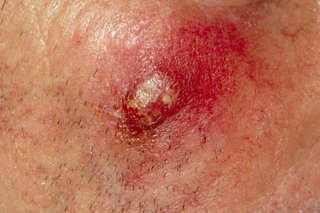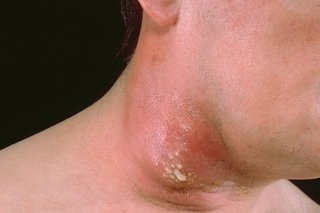Boils and carbuncles are red, painful lumps on the skin. They are usually caused by a bacterial infection.
Symptoms of boils and carbuncles
Boils
A boil is a lump that can develop anywhere on your skin. You're most likely to get one in an area where you have hair, sweat and friction. For example, the neck, face or thighs.

Over time, pus forms inside the boil, making it bigger and more painful. Most boils burst and heal within 3 weeks. They do not usually leave a scar.
Boils are common in teenagers and young adults, usually in males.
It can sometimes be difficult to tell the difference between a boil and a spot. Boils tend to grow bigger and become more painful. Your GP can diagnose a boil from its appearance.
Carbuncles
A carbuncle is a cluster of boils that usually develops over a few days. The areas most commonly affected are the back, thighs, or back of the neck.

A carbuncle can be up to 10cm in size and can leak pus from different points.
You may also:
- have a high temperature of 38 degrees Celsius or above
- feel generally unwell
- feel weak and exhausted
Carbuncles are less common than boils. They happen most in middle-aged and older men or people with a weakened immune system.
Causes of boils and carbuncles
Boils and carbuncles are often caused by bacteria called staphylococcus aureus (staph bacteria). The bacteria infects one or more hair follicles. It is common for staph bacteria to live on the surface of the skin or in the lining of the nose without causing harm.
You can get a boil when bacteria enter the skin through cuts and grazes. Your immune system then sends infection-fighting white blood cells to kill the bacteria.
Over time, pus forms inside the boil. This is from a build-up of dead white blood cells, skin cells and bacteria.
A carbuncle develops when the infection spreads further beneath the skin.
Preventing boils and carbuncles
You cannot always avoid getting a boil or carbuncle. There are things you can do to reduce your risk.
Do
-
wash your skin regularly using a mild antibacterial soap
-
clean any cuts, wounds or grazes - even small ones
-
cover cuts, wounds and grazes with a sterile bandage until they heal
-
eat well and exercise regularly to boost your immune system
How boils and carbuncles spread
Boils and carbuncles can spread to another part of the body or to another person. There are things you can do to stop them spreading.
Do
-
wash your hands after touching affected areas
-
use a separate face cloth and towel
-
wash underwear, bed linen and towels at a high temperature
-
cover wounds with a dressing until they heal
-
put used dressings in the bin straight away
Non-urgent advice: Speak to a GP if
you have a:
- carbuncle
- boil on your face or spine
- boil that keeps getting bigger and feels soft and spongy to touch
- boil that does not heal in 2 weeks
- boil and a high temperature
- boil or carbuncle and you have diabetes
Your GP can diagnose a boil or carbuncle by looking at it.
Further tests
You may need further tests, such as a blood test or skin swab, if you have:
- a boil or carbuncle that keeps returning or does not respond to treatment
- many boils or carbuncles
- a boil or carbuncle and a weak immune system - for example, if you are having chemotherapy
Content supplied by the NHS and adapted for Ireland by the HSE
